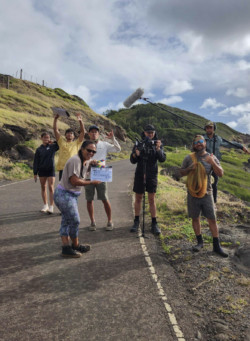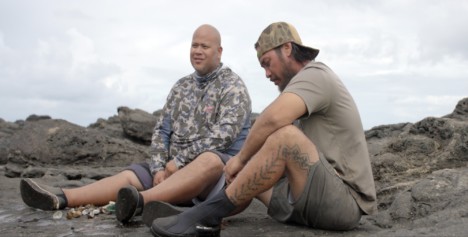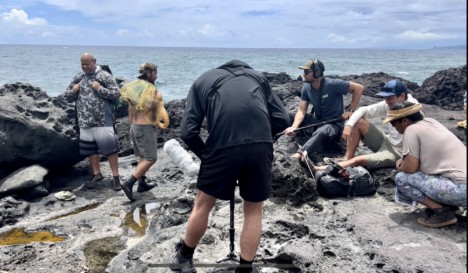Molokai-Made Film ‘Kala’ Packs Powerful Messages
By Catherine Cluett Pactol | Reporter

Photo courtesy of Matt Yamashita.
The Molokai cast and crew behind a new short film hope its poignant messages will open up community dialogue about addiction, recovery and family relationships. “Kala,” a 20-minute narrative scripted film, is written and directed by Molokai filmmaker Matt Yamashita.
“At its core is the theme of healing through forgiveness,” said Yamashita. “It revolves around the relationship of two estranged brothers who had a falling out and hadn’t spoken to each other in years because of the main character’s history of substance abuse.”
“Kala” had its world premiere on Molokai last month and has since received honorable mention at the Hawaii International Film Festival. It will also be entered in film festivals across the Pacific over the next year.
It is written, directed and edited by Yamashita, produced by Miki’ala Pescaia and Yamashita, and actors are Josh Pastrana, Jr Joao, Keoki Pescaia, Sui Joao, Micah-Shayne Ayau, Kniden Dela Cruz-Ayau and Treydan Ayau. Sound recording was done by Kelly Pauole and Kahale Ramos.
Yamashita has become known for his compelling documentaries but he wrote Kala’s narrative script more than 10 years ago. He credits the cast and crew with being able to complete the whole film in just a couple months, with Kala’s videography being captured in just two days of shooting on Molokai’s east end.
Yamashita said he hopes the film will help those in his own community, and others, find healing.
“The whole story revolves around them reconnecting, airing some of their hurts and resentments, and ultimately, finding a pathway to healing and this all is at the request of their dying father,” he explained.
From the film’s use of the pidgin language to its highlighting of throw net fishing, Yamashita said he wanted to produce a film that’s true to his island’s lifestyle and culture.
“Our intention in making this film was for a Molokai audience first and foremost,” he said. “We hope that it’s a positive take-away. Either, ‘Hey, I have unresolved relationship issues with a family member or a friend and maybe I should look at that.’ Or ‘Hey, I’m suffering from substance abuse or I’m suffering from mental health or emotional stress or problems. Maybe I should talk to somebody about this.’ Or even on the simplest level, walk away just feeling really proud. Like, ‘Hey, I’m from Molokai. I throw net or I’m a fisherman, I’m a hunter, and this story makes me makes me feel good that this is something that is unique to our way of life and something to feel good about.’”
The Molokai community is also suffering recent losses to mental health illness and suicide. Yamashita said the timing felt right to open up those tough conversations through the film.
“We’re hoping it becomes a tool for our specific community to have important dialogue on important matters,” he said.
Jr Joao is the actor behind one of the film’s main characters. It was his film debut, and he said he originally said no to the role because it was “out of his comfort zone.”

Photo courtesy of Matt Yamashita.
“I read the story, read the dialogue, and was something that went really hit home for me,” he explained. “In the past, I had battles with addiction myself. I felt strongly about sharing [the film] with the public because it hits home in a lot of areas, whether you’re struggling with addiction or whether you’re struggling with forgiveness, or even the family members of people who have struggle with these things.”
Like Yamashita, he believes in the film’s message to inspire change.
“So when I read it, it was something that really moved me. So I told Matt, I said, ‘OK, let’s do it,’” continued Joao. “I hope that this this film can express the importance about forgiveness. We only get a short time here on Earth. And just love each other. Forgive. Make amends. Once somebody passes on, that option of closure is gone and a lot of times forgiveness is not necessarily for the other person, but it’s for our own selves.”
The film’s name, “Kala,” refers to a species of unicorn fish but the Hawaiian word also means to release or forgive.
Yamashita talked about the kaona, or veiled meanings, throughout the film.
“We started with the scene where the father is on his death bed and he makes the request for his sons to go out and catch kala. [He says,] ‘I’m ono for kala. I’m hungry for kala,’” Yamashita explained. “He had just finished making this thrown net. Although the son thinks he’s asking him to go out and catch the fish for his dying father with his brother, father is actually saying, ‘Before I leave this world, I need you and your brother to find forgiveness.’”
Ultimately, Kala is a story about connection.
“Not passing up opportunities to listen,” Yamashita said, “not passing up opportunities to share, not passing opportunities to connect, not passing opportunities to see each other on a deeper level.”
This week, “Kala” will have several showings on Molokai. It will be paired with a one-hour documentary film from Aotearoa called “Shot Bro,” the story of Rob Mokaraka, who survived his suicide attempt, and since then, has shared his mental health struggles and his commitment to address those issues across New Zealand, especially within Maori communities. Intended to spark conversations of healing and aloha, Yamashita said the screenings will also precede Mokaraka’s planned visit to Molokai next month, which Yamashita said will be “really powerful and really transformative for those who attend.”
“Kala” and “Shot Bro” will be shown on Thursday, Nov. 9 at Kualapu’u Rec Center at 6 p.m. and Friday, Nov. 10 at Kilohana Rec Center at 6 p.m.

Photo courtesy of Matt Yamashita.











Don't have a Molokai Dispatch ID?
Sign up is easy. Sign up now
You must login to post a comment.
Lost Password